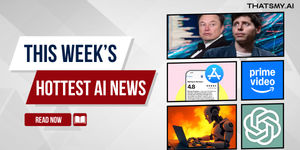Drowning in PDFs and struggling with literature reviews? Elicit AI transforms research by summarizing papers, extracting key insights, and answering complex questions—all in seconds! But is it the ultimate AI research tool, or does it fall short? We break down its features, pros, pricing, and real-world performance so you can decide if it’s worth it. Save time and research smarter—discover Elicit AI today!

Are you spending hours searching for relevant academic papers, only to end up drowning in a sea of PDFs with no clear direction? This is a common struggle for students, researchers, and academics alike.
Literature reviews can be tedious, time-consuming, and overwhelming. But what if there was a tool that could do the heavy lifting for you? Enter Elicit AI, your own personal AI research assistant designed to make academic research faster, more innovative, and more efficient.
This review will explore Elicit AI’s features, benefits, and limitations to help you decide if it’s the right tool for your research needs.
Elicit is your personal AI research assistant that makes finding scientific information simple and fast. No more endless searching or complicated papers—Elicit quickly finds relevant articles, summarizes key points clearly, and gives you easy-to-understand insights.
Whether you're a student, researcher, or professional, Elicit saves you hours of research time so you can focus on what really matters. Discover a smarter, easier way to do research.
Developed by Ought, an AI research lab.
Uses Natural Language Processing (NLP) to analyze academic papers.
Summarizes research papers.
Extracts key insights from multiple sources.
Answers research-related questions in context.
|
Feature |
Elicit AI |
Google Scholar |
Other Research Tools |
|
AI-Generated Summaries |
YES |
NO |
NO |
|
Contextual Question-Answering |
YES |
NO |
NO |
|
Data Extraction |
YES |
NO |
YES |
One of the biggest concerns when using AI tools is data privacy. Does Elicit AI store your queries? The platform ensures secure processing of user data without retaining personal information for long-term storage.
Elicit is an AI research assistant designed to streamline and enhance your research process. It simplifies tasks that usually take hours, helping you find and understand information quickly.
Automated Summarization (Free & Paid): Quickly generates clear and concise summaries of research papers, reducing the need to read full documents.
Data Extraction (Free & Paid): Automatically pulls important data, including details from tables and results sections, making analysis easier and faster.
Systematic Reviews (Paid): Automates the systematic review process, dramatically reducing the time needed, and allowing you to focus more deeply on insights.
Comprehensive Research Reports (Paid): Creates in-depth reports based on rapid systematic reviews, helping you quickly grasp new research topics and validate claims.
PDF Upload and Analysis (Free & Paid): Lets you upload your own PDFs for direct analysis, making it convenient to work with specific documents.
Source Transparency (Free & Paid): Provides original source quotes for every insight or summary, ensuring accuracy and easy verification.
Interactive Q&A with Papers (Free & Paid): Allows you to directly ask questions about the content of papers, enhancing your understanding and saving valuable research time.
Elicit offers essential features for free, while more advanced and powerful tools require a paid subscription.
To demonstrate how Elicit AI simplifies research, let’s look at an example: finding papers on climate change policy.
|
Step |
Action |
Description |
|
1 |
Input Query |
A user enters a research question or keywords. |
|
2 |
AI Search & Analysis |
Elicit AI fetches relevant academic papers. |
|
3 |
Summarization |
AI-generated insights highlight key findings. |
|
4 |
Data Extraction |
Extracts methodology, sample size, and conclusions. |
|
5 |
Citation Export |
Users can export references in preferred formats. |
Elicit AI is designed to be intuitive, allowing users to get started with minimal effort. However, optimizing search queries can take some practice.
|
Pros |
Cons |
|
Saves time by automating literature reviews. |
May not replace manual critical analysis of research. |
|
AI-driven insights help refine research focus. |
Limited to publicly available research (excludes some paywalled papers). |
|
User-friendly, even for non-technical users. |
Subscription costs may be high for students. |
|
Supports multiple research disciplines. |
AI-generated summaries may miss critical perspectives. |
|
Integrates with citation management tools. |
|
Feature |
Elicit AI |
Research Rabbit |
Semantic Scholar |
Scite.ai |
|
AI Literature Review |
YES |
NO |
NO |
YES |
|
Question-Based Search |
YES |
NO |
YES |
NO |
|
Data Extraction |
YES |
NO |
YES |
YES |
|
Citation Management |
YES |
YES |
YES |
YES |
|
Free Access |
Limited |
YES |
YES |
Limited |
Elicit AI offers both free and paid plans, making it accessible to different types of users.
Free Plan: Limited searches and basic features.
Paid Plan: Unlocks unlimited searches and advanced AI tools.
Student & Institutional Discounts: Some discounts are available.
Refund Policy & Free Trial: Users can test premium features before committing.
Better Accuracy: Improving AI-generated summaries.
More Database Access: Potential inclusion of paywalled journals.
Expanded Tool Integrations: Better Zotero and Mendeley support.
Addressing AI Bias & Ethical Concerns: Striving for fair and objective insights.
Final Rating: 4/5
Who should use Elicit AI?
Best for: PhD students, systematic review researchers, and policy analysts.
Not ideal for: Casual learners or those who prefer manual research methods.
If you’re looking for an AI-powered tool to speed up literature reviews and extract key insights, Elicit AI is definitely worth trying. However, it might not be the best standalone tool if you prefer deep, manual analysis.
Try the free version and see if it works for your research needs!
Sign up to gain AI-driven insights and tools that set you apart from the crowd. Become the leader you’re meant to be.
Start My AI Journey
ThatsMyAI
7 March 2025